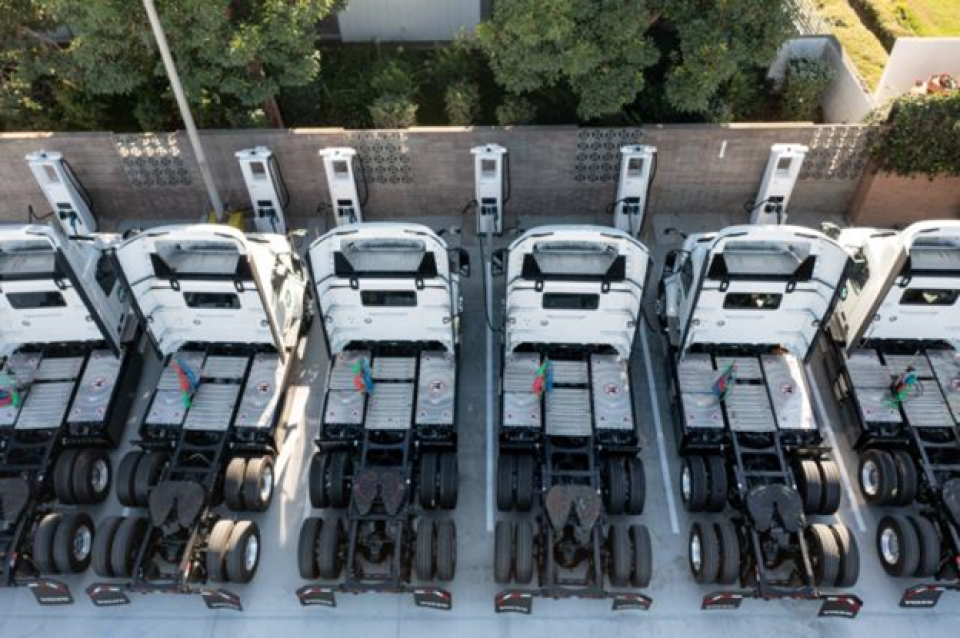Through bold action and private sector decarbonization innovation, Prologis continues to stay ahead of what’s next

Prologis is the world’s largest owner and developer of logistics real estate and a leader in sustainability, innovation, and the development of decarbonization solutions.
A longtime partner of Trio, Prologis was the first logistics real estate company with an approved Science-Based Target to reduce greenhouse gas (GHG) emissions. The company offers a suite of services to its customers through its Prologis Essentials program, which includes a variety of clean energy offerings.
After releasing its first annual sustainability report in 2007, that same year Prologis began installing solar on the roofs of its buildings. A year later, the company announced an initiative with Southern California Edison (SCE) to provide rooftop space in one of its distribution parks for a solar panel installation pilot project, with SCE making the capital investment in the panels and harvesting the energy for their customers’ use.
Fast forward to today:
“We have 1.2 billion square feet of real estate worldwide. With that scale comes responsibility,” said Susan Uthayakumar, chief energy and sustainability officer at Prologis. “We really have an opportunity to help our customers in their sustainability journeys. We want to lead the industry in terms of decarbonizing buildings, including the energy consumption from customer activity within our facilities.”
Prologis has $208 billion in assets under management, 1.2 billion SF of space in 19 countries, and 6,600 B2B and retail customers across the globe, while 2.8 percent of the world’s GDP flows through Prologis’ buildings each year.
In 2022, Prologis announced an ambitious commitment to achieve net-zero emissions across its value chain (scope 1, 2 and 3) by 2040. The company plans to meet its 2040 goal through several interim targets, including 1 GW of solar generation capacity, supported by storage, by 2025; carbon-neutral construction by 2025; and net-zero operations by 2030.
The company’s goal is aligned with the Science Based Target initiative (SBTi) and includes partnerships to drive decarbonization across the industry, including through innovation in sustainable building materials.
In addition to solar, Prologis offers EV charging and battery storage to its customers.
Last year, Prologis was ranked second in the U.S. for onsite solar generation, according to the Solar Energy Industries Association’s (SEIA) Solar Means Business Report.
Trio has been an ongoing partner in Prologis’ efforts to incorporate distributed energy resources, including supporting the company with nearly 94 MW of pending and installed solar, as well as onsite battery storage.
Reducing emissions across the value chain
Onsite solar generation will play a crucial role in helping Prologis meet its emissions reduction goal. Approximately 75 percent of the company’s emissions are from customer consumption of energy, with the remaining 25 percent related to construction and development activities.
To help meet its ambitious net-zero goal, Prologis aims to have every eligible new development and redevelopment achieve a sustainable building certification. The company currently has 550 buildings that have received a certification, which accounts for 20 percent of its global portfolio.
“That’s 235 million square feet of certified sustainable space – it’s about the size of six Central Parks. We’re super proud of that,” Uthayakumar said.
Additional reductions in GHG emissions come from measures like electrification, energy efficiency, LED lighting, cool roofs, and the use of lower-emissions construction materials and methods.
Supporting communities
Prologis also engages with the communities in which its facilities are located through initiatives like community solar.
In California, the company has partnered with the Clean Power Alliance (CPA) to help bring fixed-rate, clean energy to local underserved communities by installing solar panels on existing facilities’ rooftops.
“It’s a large site and the community is able to have the power at a 20 percent discount,” Uthayakumar said. “When you build a facility, you want a community to be excited to have you, so we do things like park life – we dedicate green recreational spaces where people can come and enjoy the space with their friends and families. It serves our employees and the community, and we’re really focused on expanding these types of benefits.”
Prologis has similar partnerships in other states, including Illinois and New Jersey, which help meet community energy needs and support greater grid resilience.
Driving to zero emissions
As more customers look to adopt electric vehicles to reduce their emissions and meet government regulations, Prologis is supporting them with fleet charging through its mobility program.
Last year, Prologis unveiled two significant electric truck charging installations on its platform.
“As a logistics company, we see a tremendous opportunity to support zero-emissions vehicles, including employee vehicles and fleet vehicles,” Uthayakumar said. “Legislation is driving this movement, particularly in Europe and California.”

Prologis works with its customers to understand their needs. The company provides expert guidance on the right vehicle and grid connection and can also deliver skilled operations and maintenance support.
“With EV charging, drivers can charge their trucks as they load and unload their goods, reducing downtime,” Uthayakumar said.
Trio has supported Prologis’ Mobility team with site assessments, engineered design, equipment procurement activities, and program management in more than four states, serving a combination of Class 8 drayage trucks and last-mile delivery vans.
Private sector innovation
Prologis is considered an innovative leader in the real estate logistics space. Its Park Moissy II DC1 project, located just outside of Paris, was built on a former industrial brownfield and has no gas connection. The site, which relies on design efficiencies, rooftop solar, and geothermal energy storage for heating, cooling, and power, will be the first logistics site in the world to be certified “Zero Carbon” from its construction phase through its use over the next 50 years.
“We really encourage local innovation,” Uthayakumar said. “As a result, you will notice that Prologis is often ahead of what’s next in terms of doing things earlier than others in our industry.”
Prologis continues to innovate across its building design and implementation. To align with the company’s updated net-zero standards, all new facilities must be built so that they are ready to support rooftop solar and EV charging.
In addition, Prologis’ construction and energy teams work together to find innovative ways to decarbonize through cutting-edge building materials.
“We know that today we don’t have a scalable solution in terms of lower-carbon cement or steel but we’re partnering with some of the largest producers of these materials to identify substitute materials and test new solutions,” Uthayakumar said. “And when we find the right solution that meets our performance level, we have the ability to bring the economies of scale.”
As an example, Prologis is working with large cement manufacturers through its membership in MIT’s Climate and Sustainability Consortium (MCSC). The Consortium focuses on creative ways to solve climate-related challenges, including transportation modes, value chain resilience, natural carbon sinks, and low carbon building materials.
“Companies – our customers – are a lot more aware of the need to decarbonize,” said Uthayakumar. “Their stakeholders – their employees, regulators, and customers – are asking for measurable actions. These conversations are coming back to us and are really driving and inspiring our work.”
